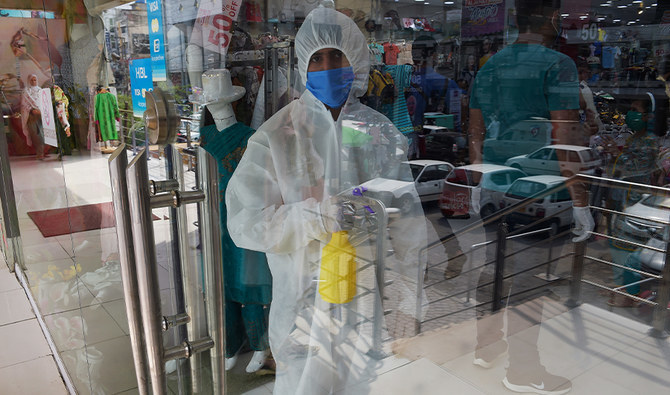KARACHI: Pakistani manufacturers hope to generate $2 billion by exporting Personal Protective Equipment (PPE) and hand sanitizers after the government granted them permission to sell these products in international market last week, exporters told Arab News on Thursday.
“We have set a target of $2 billion for this year and started exporting PPEs and hand sanitizers,” Ijaz Khokhar, chief coordinator of Pakistan Readymade Garments Manufacturers and Exporters Association (PRGMEA), said.
Pakistani manufacturers informed they were getting inquiries from international buyers who wanted to purchase these products much before the formal export began on June 26.
“We shared export samples with our potential buyers, got them approved and agreed on their rates,” Khokhar continued. “The export of face masks is still banned and we are seeking permission for that.”
According to government officials, the country has so far received $100 million of orders. “We expect this figure to cross $500 million in the coming months,” Federal Minister for Science and Technology Fawad Chaudhry said in a Twitter post last month.
Pakistani exporters expressed hope that their new foray into the international market would help the country compensate for its export losses due to cancelations of orders after the outbreak of the coronavirus pandemic earlier this year.
“Pakistani businesses suffered significant losses after the virus outbreak since many of the buyers canceled their export orders due to shrinking demand of different products. These PPEs and hand sanitizers will compensate the country for its losses,” Khokhar noted.
The country mainly plans to export PPEs to the Gulf countries, though it is also trying to explore the US and European markets.
“Our exports are mainly meant for the Gulf region. Exporters have applied for CE certification [to show conformity with health, safety, and environmental protection standards for products] which is mandatory for the European Union and are trying to secure the required approval from the Food and Drug Administration of the United States,” Khokhar said, adding: “Both are expected within a week. It will make it easier for us to export to these regions after that.”
Some exporters believe, however, that Pakistan may not be able to capture a major chunk of the market since it is getting into the game a bit late in the day.
“Many manufacturers and suppliers from other countries have also entered the market where there was a huge vacuum just a couple of months ago. Pakistan’s late decision in this regard is also expected to cut its market share. Export should have started at least a month earlier,” Muhammad Jawed Bilwani, chairman of Pakistan Apparel Forum, told Arab News.
In early June 2020, under its “make in Pakistan” strategy, the government decided to allow export of PPEs after the country’s textile sector changed its production strategy and started manufacturing face masks and protective suits. Exports of Tyvek suits, N95 and other surgical masks still remain banned.
“I advised him (Razak Dawood) in April to focus on PPE export and he followed up, opening a new window of opportunity for Pakistani companies,” Shoaib A. Kothawala, a leading textile entrepreneur from Pakistan who is now based in the US, told Arab News from California.
“Pakistan has a comparative advantage in the personal protective equipment (PPE) market,” a senior World Bank economist, Gonzalo Varela, recently claimed.
“Many textile and apparel firms have adapted quickly to the COVID-19 crisis and shifted their production to face masks and shields for health care providers and frontline workers at home and abroad,” he wrote in a blog posted at the WB website.












